- Home
- Eoin Colfer
Novel - Airman Page 29
Novel - Airman Read online
Page 29
It was a pertinent question, but not one that Conor seemed inclined to answer. He turned and strode toward the flat rocks, avoiding the inquiring gazes following him. “It’s complicated,” he mumbled. “Technical. I still have some calculations to complete.” And then, as though that were the end of the matter, “Anyway, where are those ash ribs? I have a few repairs to make.”
Uncle lit himself another cigarette. “I know Great Saltee well enough. If Airman needs the same to land as he does to take off, he’s not going to find it on that island. Anything flat on Great Saltee has a house on it. The only place he could possibly land would be outside the Palace Gates in Promontory Square.” Uncle laughed at the lunacy of this notion. “Promontory Square. Imagine. If Marshall Bonvilain were a spider, that would be his web. Which would make Airman . . .”
“The fly,” breathed Linus.
Great Saltee
Marshall Hugo Bonvilain was uncommonly excited; after all, this day was to be a momentous day, not just for him but for every Bonvilain who had ever been forced to toady to an idiot king. Today all their sacrifices would be made righteous. It had taken hundreds of years to accomplish the task, but finally the Bonvilains were about to supplant the Trudeaus.
And so when Sultan Arif had arrived in Bonvilain’s office that afternoon, he’d found the marshall almost giddy with anticipation. Bonvilain stood at the office window, clapping his hands rapidly in time to the Strauss waltz being played by a lone violinist in the corner. Sultan cleared his throat for attention.
“Ah, Captain, you’ve come,” said Bonvilain, delighted. “What a day, eh? Historic and all that. I love Strauss, don’t you? People take me for a Wagner man, but I say just because my duties are sometimes gloomy doesn’t mean that I have to be. No, Strauss is the man if you’ve had a trying day. I think I shall have an Austrian orchestra brought over for my swearing-in as prime minister.”
Sultan was surprised by this lack of discretion, and it showed in his face.
“Oh, don’t worry about him,” said Bonvilain, jerking a thumb at the musician. “Poor chap was run over by a horse and carriage a few years ago, left him deaf and blind. He plays from memory. I got him from Kaiser Wilhelm, only arrived this morning. It’s an omen, I said to myself. How can anything go wrong today?”
Sultan began to feel nervous. Things always went wrong around the marshall, usually for other people. “God willing. All will proceed well.”
“How can it not?” asked Bonvilain, stepping in from the balcony. “The queen and her loyal supporters will soon be dead. There are no heirs, and so I will be sworn in as prime minister. This Broekhart boy, this Airman, will no doubt attempt some form of rescue, and then we will have him, too. And even if he does not come, once Isabella is gone he will be nothing more than a disgruntled fugitive.”
The marshall sat at his desk, smoothing the felt surface with one palm. “Now, let us talk about poison.”
Sultan Arif placed a corked ink bottle on the desk. It was half filled with a pale yellow powder. “This is wolfs-bane from the Alps,” he explained. “A thimble of this can be mixed with a glass of wine or sprinkled over food.
Several minutes later the victim will experience a strange tingling in the hands, followed by chest pain, extreme anxiety, accelerated heartbeat, nausea, vomiting, and eventually death due to respiratory arrest.”
“Eventually,” purred Bonvilain. “I like that.” He picked up the bottle, holding it to the light as if its deadly qualities would become more apparent. “Now, Sultan, you know how vital it is that I appear blameless in all of this. I must suffer with the rest, and only my strength shall save me. It cannot be sham. The queen’s own physician must confirm that I am at death’s door.”
“Then you must drink only half of your glass,” said Sultan. “That is half a thimble of wolfsbane. You will suffer as wretchedly as the others, but without the respiratory arrest.”
Bonvilain poured a glass of brandy from a crystal decanter. “Half a thimble, you say? Are you certain? You would wager my life on it?”
“Reluctantly,” replied Sultan.
“I have an idea,” declared Bonvilain, tapping a pinch of powder into his glass. “Why not test the measure on the musician?” He pulled a sad face. “But you are so fond of blind men, and I am eager to hear more of his repertoire.”
Sultan felt a bead of sweat run down his back. “There is no need to test it, Marshall. We have used this method before.”
“But not on me. I want you to take it; that would reassure me.”
“But it will take hours to recover,” protested Sultan weakly. “I am needed today.”
“You are needed, Captain,” said Bonvilain, proffering the tumbler. “And this is what you are needed for.”
“But if the Airman arrives?”
“If the Airboy arrives, I will deal with him. I have been on a few campaigns, Sultan. I do know how to swing a sword. I am asking you to drink this, Captain. Will you refuse me again?”
Sultan felt trapped in this opulent cage. The portraits of Bonvilain marshalls through the ages glared down at him, daring him to disobey. I could kill him, he thought. At least I could try.
But it was a battle of the minds, and Sultan had already lost. He had been doing the marshall’s bidding for years now. I have done worse than this. Much worse.
Sultan Arif thought of the damage he had done in the name of the Saltees, the lives he had ruined. The men who suffered in prison still.
He reached out, took the glass, and threw the liquid into the back of his own throat.
“Bravo,” cried Bonvilain. “Careful with that glass now, it’s crystal.”
Sultan plonked the glass on the table and waited for the poison to take effect. Numbing of the extremities was the first symptom of wolfsbane. When his fingers began to tingle, Sultan stared at them as though they belonged to a stranger.
“Numb,” he said.
“Capital,” cried Bonvilain. “It begins.”
Sultan was all too aware of the misery the coming hours contained. He would suffer the pain of the damned and, if he was lucky, live to forget it.
“Play something doleful,” Bonvilain called to the violinist, though the man could not hear him. “The captain needs cheering up.”
An hour later, when Sultan was clawing at the carpet, his lungs aflame, each breath like a dagger wound, Bonvilain squatted before him, clicking his fingers for attention. “Now, Captain,” he said genially. “The next time I tell you to kill a blind man, you do it. Understood?”
Sultan may have nodded, or he may have lapsed into spasm. Either way, Bonvilain felt certain that the lesson had been learned.
St. Patrick’s Bridge
The time had come to fly. Sundown and low tide. The shale bridge was as smooth as it could ever be, and the engine was primed for takeoff. There was nothing to hold Conor back but his own anxieties.
He sat on the flat rocks watching the sky for birds. “Do you hear any bats?” he asked Linus, who reclined beside him, long skinny legs stretching down to the sand.
“Bats?”
“Yes. If this is a haunt for bats, they could gum up the propeller.”
Linus was silent for a long moment. “No. No bats. But something is lurking on the ridge. I hear shuffling. A lot of shuffling.”
Conor stood, craning his neck backward for the view. The villagers lined the ridge like teeth in a vast mouth, more arriving every second to fill the gaps. They peered down to catch a squint at the Airman.
“All of Kilmore is here,” he groaned.
“What? Did you expect to give away diamonds, build a heavier-than-air flying machine on the beach, and stay a secret? You are the Airman, come to fight Bonvilain. He is not a popular man.”
“Look, they’re lighting torches now. They have lamps.”
Linus tapped his temple. “I can’t look, boy. Blind, remember? And anyway, couldn’t you use a few lights?”
“My God!” exclaimed Conor. “Of course. Lights woul
d be most helpful.”
“Well then, invite those good folk to come down. After all, in a few hours none of this will matter. The queen will know the truth; Bonvilain will be banished; and you will once again be Sir Conor of the Saltee Islands.”
“Not necessarily,” said Conor. “There is an alternative ending.”
Linus stood, brushing off the seat of his pants. “Not tonight, my young friend. The planets are aligned; the runes have been thrown; I found a four-leaf clover in the grass. Tonight, after three years, Conor Broekhart comes back from the dead.”
“Perhaps,” said Conor. “But for how long?”
Great Saltee
Two-year-old Sean Broekhart lay in his bed, but he was not sleepy.
“I think he has a fever,” said Catherine, touching the back of her hand to the young boy’s forehead. “Perhaps we should stay at home.”
“Stay home,” agreed the smiling Sean.
Declan stood in the doorway, shoulders broad in his dress uniform. “Sean is fine, darling. He thrives. Were he any stronger, I would enlist him right now. If you don’t want to go, just say the word. No need to drag little Sean into your schemes.”
Catherine straightened a row of medals on her husband’s chest. “I have been saying the word since the invitation arrived. It’s so strange, don’t you think? This sudden desire of the marshall’s to celebrate Conor?”
Declan’s brow creased. A lot had changed in these past weeks. He felt more himself than he had in years, three years, to be exact. And while he still felt gratitude for what Hugo Bonvilain had done for Conor and the family, he had concerns about the man’s methods, especially the tight rein he held over Little Saltee. Recently his men had begun to tell him horror stories about the prison. “It’s not strange, it’s natural. Hugo feels some guilt too. After all, his men were supposed to be guarding the king. That was always the problem with Nicholas: he did not want to live his life under guard. He was too trusting by far.”
“Talk to Isabella, Declan. She is expecting it.”
“You have already spoken to the queen about this?”
Catherine took her husband’s arm. “She spoke to me. Isabella has concerns, too. She needs an ally that the men will listen to. You are the only one who can challenge Bonvilain.”
Declan did not want this burden. “The marshall is my superior officer and he has been very good to us.”
“I don’t wish to wound you, Declan, but your mind has been elsewhere these past years. You have been blind to the injustices that grow commonplace on the Saltees. Nicholas’s dream was to create a Utopia for the people. That has become Isabella’s dream, too. It is not Hugo Bonvilain’s. He wishes to be prime minister, he has always wished it.”
Declan admitted the facts like shafts of light through chinks in a heavy curtain. “I have heard things. Perhaps I can investigate.”
Catherine’s grip tightened on his arm. “One more thing—perhaps this is not the night to say it—but Victor Vigny, a traitor?”
“They found letters in his apartment detailing the island’s defenses. My own men were with Bonvilain when he found the bodies.”
“I know all about the evidence, but I knew Victor, too. He saved us, remember?”
“He saved himself,” countered Declan, then gently: “Victor was a spy, Catherine. They are a cold breed. We saw of him what he wished us to see.”
There were tears in Catherine’s eyes now. “Just promise me you will stand by Isabella, whatever she decides to do. Your first loyalty is to her.”
“Of course—she is my queen.”
“Very well,” said Catherine, drying her eyes. “Now, I must ready myself again. Why don’t you tell your son a story, put him off to sleep before the nanny arrives?”
Little Sean seized on the word. “Story, Daddy,” he called. “Story, story, story.”
Declan squeezed his wife’s hand once before she left the room. “I am here now, Catherine. I will take care of us all, including the queen.” He sat on Sean’s bed, and as usual he could not gaze upon one son without thinking of the other, but he forced the melancholy from his features and smiled down at the boy. “Well, Sean Broekhart, not feeling sleepy tonight?”
“No sleep,” replied Sean belligerently, tugging his father’s sleeves with small fingers.
So small, thought Declan. So fragile.
“I think one of my stories might do the trick. Which one would you like? Captain Crow’s army?”
“No, Crow,” said Sean, his lip jutting. “Conor. Tell me Conor story. Sean’s budder.”
Declan was taken aback. Sean had never asked about Conor before, and for some reason Declan had never anticipated this moment. “Conor story,” insisted Sean, pummeling his daddy’s leg.
Declan sighed. “Very well, little one. A Conor story. There are many stories about your brother, for he was a special person who did many amazing things in his life. But his most famous deed, the one for which he earned the gold medal in the cabinet, was the rescue of Queen Isabella. Of course she wasn’t a queen in those days, merely a princess.”
“Princess,” said Sean contentedly.
“On this particular summer afternoon, Conor and Isabella had exhausted the fun to be had tracking an unused chimney to its source and decided to launch a surprise pirate attack on the king’s apartment. . . .”
And so Declan Broekhart told the story of the burning tower, and when it was over and the princess saved, he kissed his sleeping boy and left the bedchamber with a heart that felt strangely lighter.
St. Patrick’s Bridge
This is madness, thought Conor. Lunacy. There are so many things that can go wrong. The engine could prove too weighty in spite of the aluminium casing. The propeller had not even been tested in a wind tunnel and could rip the nose apart as easily as propel the craft. The untreated muslin was lighter than the treated variety, but might not deflect the air currents sufficiently to give lift. The steering was rudimentary at best and would allow no more than a twenty-degree turn, and even that could pull the wings off. The wing tips may not provide enough balance for a takeoff. So many things.
St. Patrick’s Bridge had become a cathedral of sorts. The villagers had made the trek down the steep path for the spectacle, and most were crowded into the natural amphitheatre above the shale outcrop. They wiggled into comfortable positions, opened baskets of food and chatted amicably while they waited. The rest lined both sides of St. Patrick’s Bridge, holding their lanterns aloft, lighting a path for the Airman.
More expectations, thought Conor. As if overthrowing a military leader were not enough, now I must entertain a village into the bargain. He made a final tour of La Brosse, holding an oil lamp close to the underside of each wing, searching for tears, smoothing down bumps. No more need for delay.
“That’s your fourth final inspection, if my ears serve me correctly,” said Linus from the shadows. “Go now, Conor, or you will miss the tide.”
“Yes, of course you are right. I should leave immediately. It must seem silly to everyone. All this preparation for such a small journey.”
Linus stepped into the lamp’s glow. The light caught him from below, casting ghostly shadows along his thin face. “You are wrong, boy. This is a momentous journey. Historic.”
Conor buttoned his aeronaut’s jacket. “Not historic, I am afraid. There will be no official record, no photographs. Nothing is acknowledged without at the very least a fellow of the Royal Society. Every week a new crackpot appears claiming to have flown.”
Linus raised his arms high to the watchers, like a conductor acknowledging his audience. “Every man, woman, and child here will remember what is about to happen on this beach for the rest of their lives, no matter what the history books say. The truth will never die.”
Conor strapped on his goggles and hat. “Linus, if something happens . . . something unfortunate . . . will you find a safe way to contact my father? He must know the truth.”
Linus nodded. “I will find a way, boy
. This old spy has a few tricks up his sleeve, but I have faith in you.”
Conor climbed the short ladder to the pilot’s seat, positioning himself carefully on the driver’s bench. Something on his jacket clinked against the frame. It was the winged A symbol. “I don’t suppose I need this anymore,” said Conor, unfastening it. “Bonvilain knows exactly who I am.” He tossed it, twinkling over Linus’s head, to the boy known as Uncle.
“A keepsake for you, so that when people tell you that this never happened, at least you will know different.”
Uncle polished the winged A on his shirt. “Thanks, Airman. I was hoping for the goggles, but I suppose you’ll be needing those.”
“Unfortunately, yes. But you can have this pair if I come back, in return for one last favor.”
“Anything,” cried the boy, already imagining strutting along Kilmore quay, goggles at a jaunty angle on his crown. “So long as it doesn’t involve bathing.”
“No. No bathing. I need two of your tallest boys to stand at the wingtips. They must be strong, and they must be quick on their toes.”
Uncle summoned his two tallest boys and positioned them as Conor had asked. “These two are so thick they make the village idiot look like Sherlock Holmes,” Uncle confided to Conor. “They’ll run straight into the sea if you want.” Then to the lads: “Run fast, won’t ye, buckos. Hold the wings level, and I’ll swap those diamonds for two bars of toffee.”
“Righto, Uncle,” said one.
“Toffee,” said the other, who looked a lot like the first.
“They can stop before the water,” said Conor, fixing his goggles. “I need them to run alongside and keep the wings balanced. As soon as I lift off, they let go. Can they do that?”
“Of course they can, they’re not thick,” said Uncle. “Sorry, they are thick. But not that thick.”
Conor nodded. “Very well. Uncle, if things go badly for me tonight, I want you to stay with Mr. Wynter; he will pay you a decent wage.”

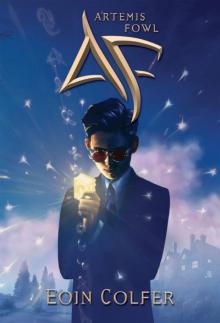 Artemis Fowl
Artemis Fowl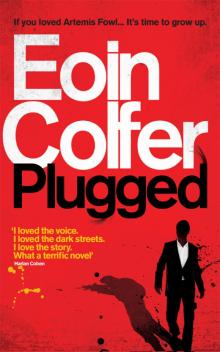 Plugged
Plugged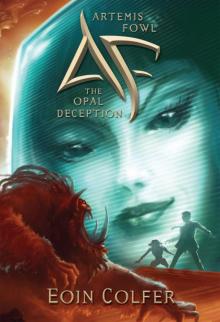 The Opal Deception
The Opal Deception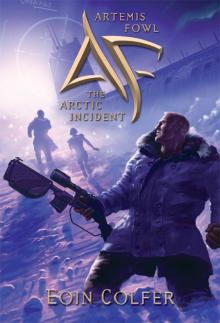 The Arctic Incident
The Arctic Incident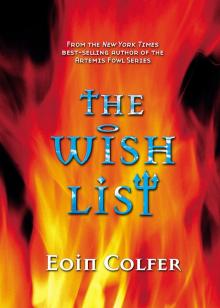 The Wish List
The Wish List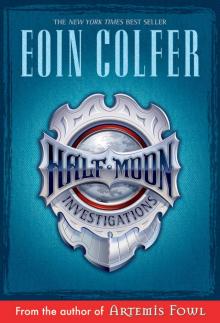 Novel - Half Moon Investigations
Novel - Half Moon Investigations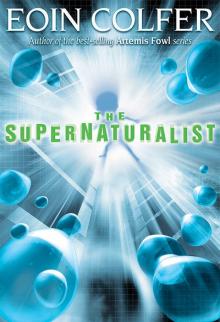 The Supernaturalist
The Supernaturalist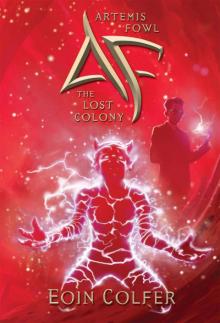 The Lost Colony
The Lost Colony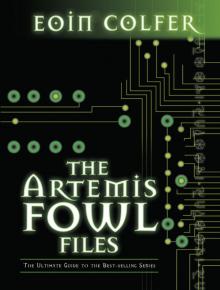 The Artemis Fowl Files
The Artemis Fowl Files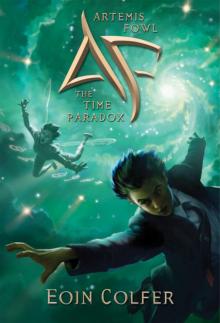 The Time Paradox
The Time Paradox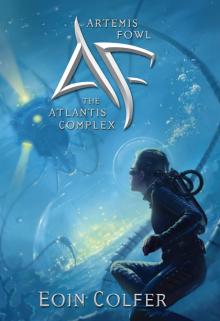 The Atlantis Complex
The Atlantis Complex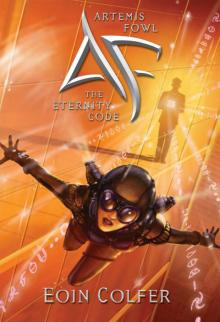 The Eternity Code
The Eternity Code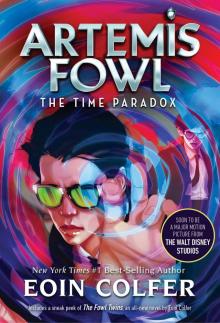 The Time Paradox (Disney)
The Time Paradox (Disney)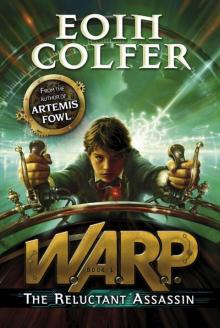 The Reluctant Assassin
The Reluctant Assassin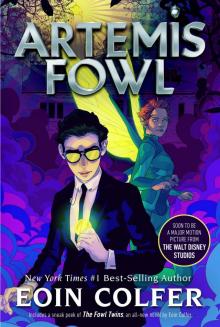 Artemis Fowl (Disney)
Artemis Fowl (Disney)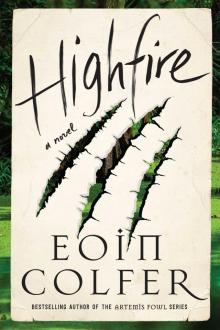 Highfire
Highfire The Last Guardian
The Last Guardian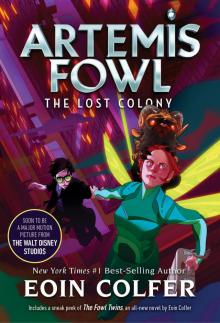 The Lost Colony (Disney)
The Lost Colony (Disney)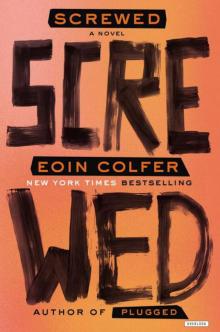 Screwed: A Novel
Screwed: A Novel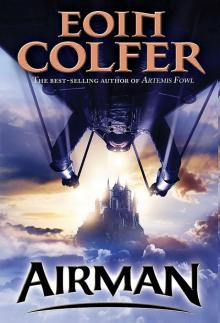 Novel - Airman
Novel - Airman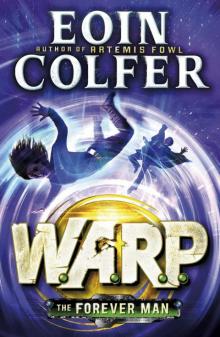 The Forever Man
The Forever Man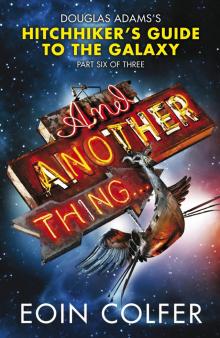 And Another Thing...
And Another Thing...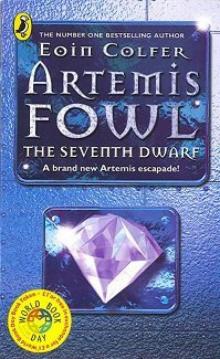 The Seventh Dwarf
The Seventh Dwarf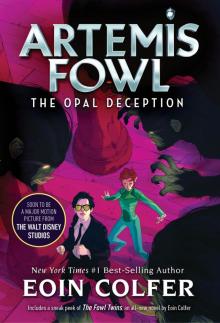 The Opal Deception (Disney)
The Opal Deception (Disney)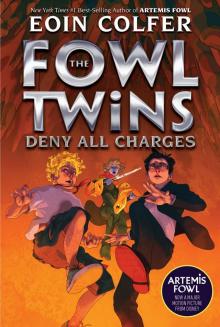 The Fowl Twins Deny All Charges
The Fowl Twins Deny All Charges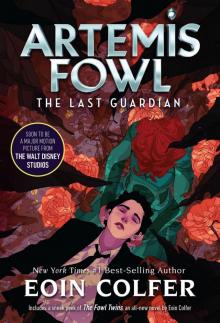 The Last Guardian (Disney)
The Last Guardian (Disney)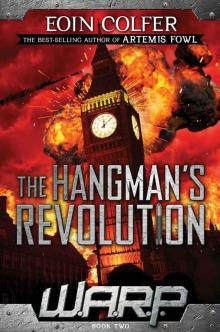 The Hangman's Revolution
The Hangman's Revolution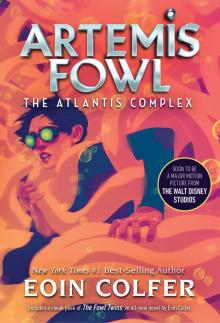 The Atlantis Complex (Disney)
The Atlantis Complex (Disney)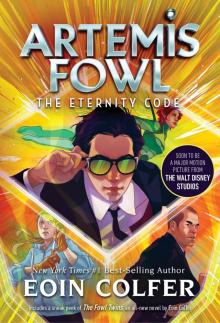 The Eternity Code (Disney)
The Eternity Code (Disney)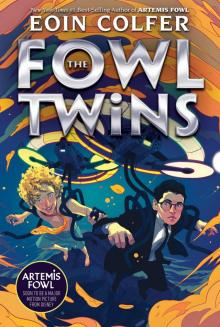 The Fowl Twins
The Fowl Twins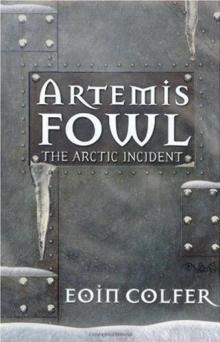 Artemis Fowl. The Arctic Incident af-2
Artemis Fowl. The Arctic Incident af-2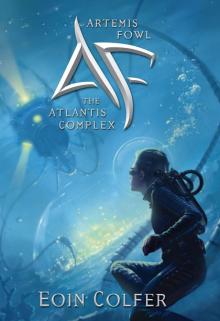 Artemis Fowl and the Atlantis Complex af-7
Artemis Fowl and the Atlantis Complex af-7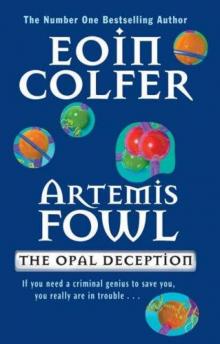 Artemis Fowl. The Opal Deception af-4
Artemis Fowl. The Opal Deception af-4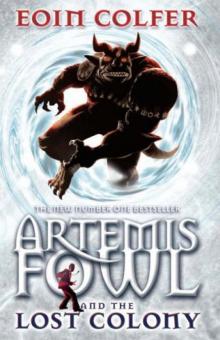 Artemis Fowl. The Lost Colony af-5
Artemis Fowl. The Lost Colony af-5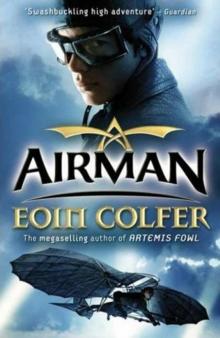 Airman
Airman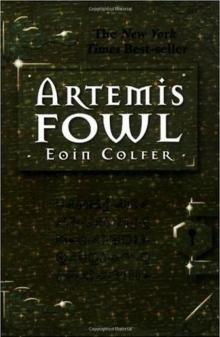 Artemis Fowl af-1
Artemis Fowl af-1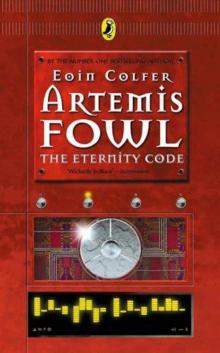 Artemis Fowl: The Eternity Code af-3
Artemis Fowl: The Eternity Code af-3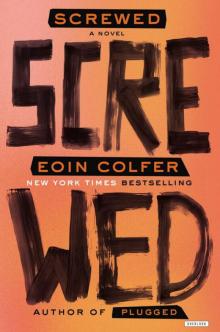 Screwed dm-2
Screwed dm-2